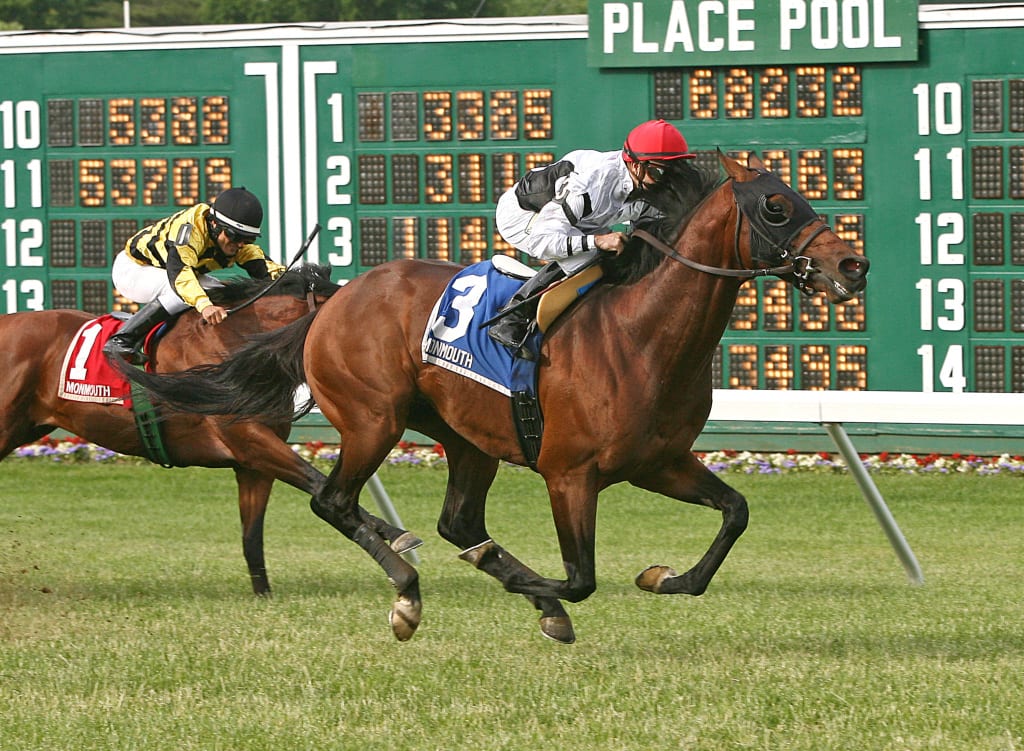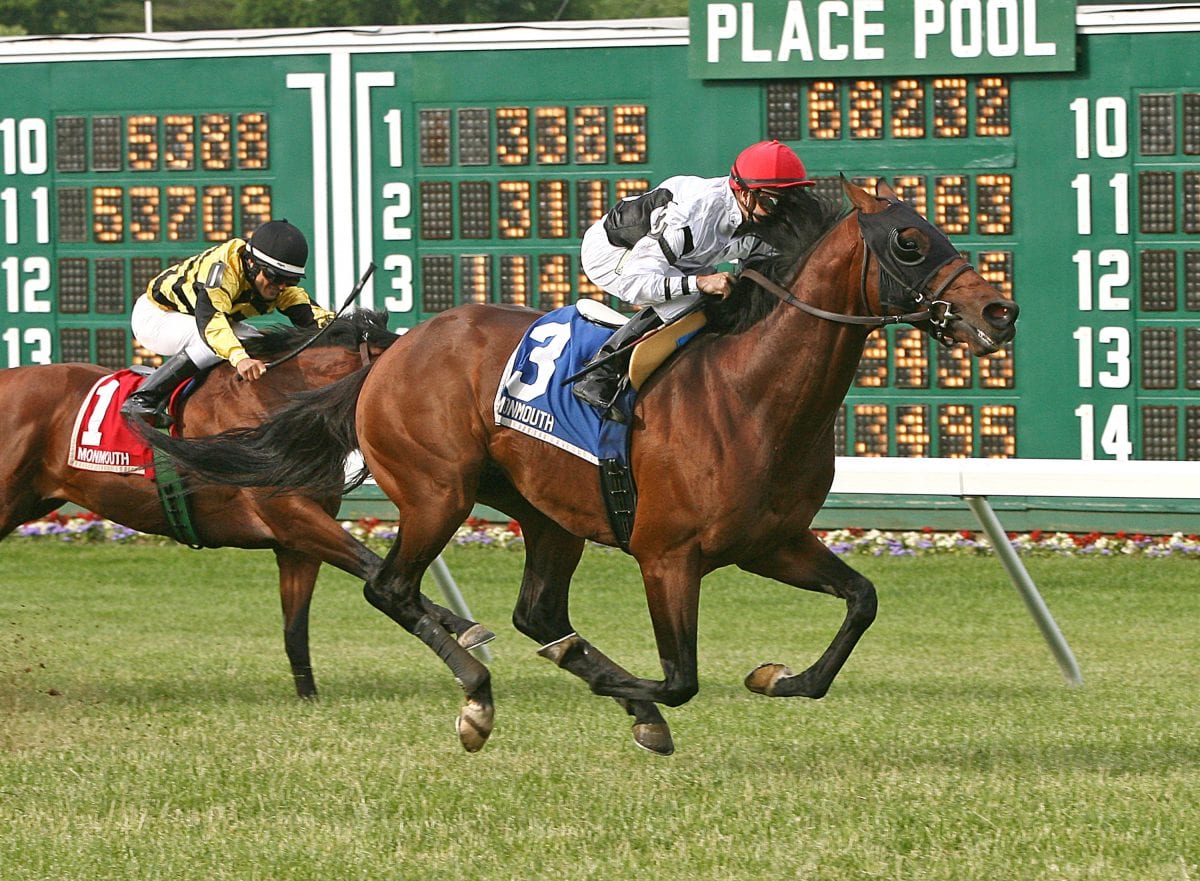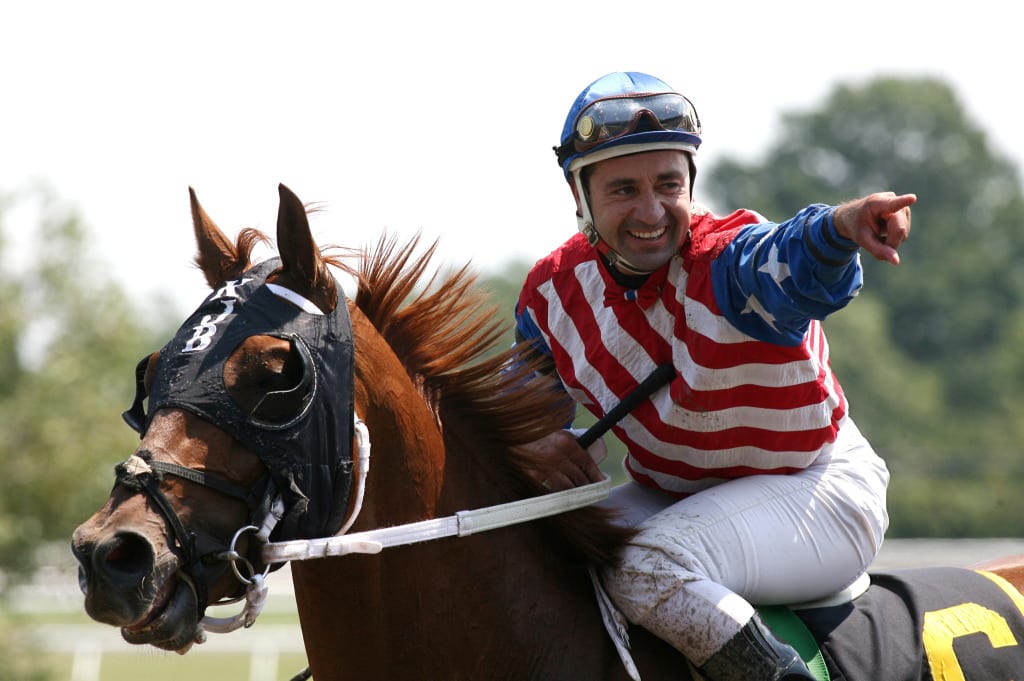by Jim Hague
The way Joe Bravo looks at life, he was simply born to be a Thoroughbred jockey.
“I was kicked off the basketball team, so what else was I going to do?” Bravo laughed. “There aren’t many power forwards who are five feet tall.”
But Bravo was born into a horse racing family.
“I’m actually a third generation jockey,” Bravo said. “My grandfather (Bartolo) was a jockey. My father (George) was a jockey. There was no question as to what I was going to do. I was born for it.”
Bravo was born in Long Branch, N.J., just a stone’s throw away from Monmouth Park, in 1971. While he grew up right near Monmouth Park, Bravo actually learned how to ride in Texas, where he lived from the ages of 10 through 16.
“I started out on quarter horses in Texas and worked my way up,” Bravo said.
At the age of 17, Bravo headed to Calder Race Course and won his first professional race in 1988 on a horse called Daffy Doc.
“I was only in Florida for a couple of weeks, then I made my way back to Jersey,” Bravo said. “I came to Monmouth Park and I remember my first week, I walked up to one of the trainers and asked for work. He said, ‘Son, this is the big time here. If you work hard enough, you might get to ride.’ I was then determined to work harder than anyone else. When someone says you can’t do it, you find a way to do it.”
It didn’t take long for Bravo to make a home at Monmouth, winning an astounding 13 riding titles there and another nine at The Meadowlands, earning the nickname, “Jersey Joe.”
“Is that a nickname?” Bravo asked. “I just thought that was automatically part of my name.”
In his 25-year career as a jockey, Bravo has enjoyed immense success. His mounts have earned more than $148 million. He’s won countless major stakes races, including four graded stakes aboard Little Mike in 2011 and 2012. He rode Danza to a third place finish in the 2014 Kentucky Derby. He won the 2004 Haskell Invitational aboard Lion Heart. He’s ridden three winners of the Pennsylvania Derby.
Now, Bravo finds himself approaching — slowly — a milestone very few jockeys have attained.
Only 30 jockeys have registered 5,000 wins, most recently Alex Solis and Gary Stevens. Bravo now has 4,991 career victories.
“It’s an amazing number,” Bravo said. “I’ve watched a lot of them get to that number, guys I respect like Angel Cordero, Jr., Pat Day and Mike Smith. I’ve watched what they did on a daily basis and tried to be a lot like them. I never thought that I would get close. I just went out and did it. I worked at it. If you want something bad enough, you’ll do anything to get it. I’m thankful to have been on a lot of good horses and worked for a lot of good trainers and owners. If you don’t have the horse under you, you don’t win, so I’m very thankful to have had the chance.”

Bravo rode Speaking Of Which to a win in the 2014 Monmouth Stakes for trainer Christophe Clement. Photo by Aubrey Therkelsen/EQUI-PHOTO.
Now 43, Bravo said that he has known he was approaching the milestone for quite some time.
“I get it thrown at me almost every day,” Bravo said. “Every one of my friends reminds me. I can’t ignore it. I ask them not to throw it at me, because I haven’t hit the 5,000th one yet. But I’m thankful and blessed to be so close.”
There’s only one problem. Bravo hasn’t won many races this year, and the milestone doesn’t feel like it’s getting any clsoer. He’s won only five times at Gulfstream Park in 118 starts this year, a trying stretch for a rider who’s won more than 18 percent of his career starts.
“I rode twice the other day and both horses ran second,” Bravo said. “I was second in two stakes races. It hasn’t broken me. I just know I have to work harder. It’s got me puzzled right now. I’ve started talking to myself that I can’t buy a winner. I almost have to laugh about it. Everything happens for a reason. Maybe I’ve been a little too relaxed, so it’s made me work even harder. I’m just going with the flow, but I’m hitting the grindstone.”
No one has ever questioned Bravo’s work ethic, both on and off the track. He’s a student of the game, constantly reviewing tapes to see if he can get a little edge here and there. He’s a workout fanatic.
“I’m at the gym three to four times a week,” Bravo said. “I have to do it at my age to keep competitive. I’ve been working my ass off for 27 years now, some 27,000 races. I’m just thankful for being able to do it for so long.”
The work ethic is what stands out in the minds of trainers who regularly use Bravo on their horses.
“He trains so hard,” said trainer Christophe Clement. “That’s why he’s been so successful. I think he’s gotten better over the years and become more experienced. He’s very talented and he’s very positive. He’s also a great guy.”
Veteran trainer Greg Sacco agreed.
“Joe has been able to come back from a few injuries [among them a broken wrist and broken leg], losing at least two years of racing, yet he’s still coming up on that number,” Sacco pointed out. “He’s not only ferociously competitive, but he works so hard to get in top physical shape. He has great hands. And when he loses, no one gets as pissed off as Joe. He has a burning desire to win. You don’t win 5,000 races by accident.”
After racing primarily on the New York circuit last year, Bravo is planning to return to his old stomping grounds in May.
“I have a new agent in Casey Moran and he’s a great guy,” Bravo said. “This is the plan to come back to Monmouth this year. I’ll be in Keeneland for April and then right after the Kentucky Derby, I’ll be back in Jersey. I loved racing in New York, some of the best racing anywhere, but it’s not home.”
Bravo maintains a home in his native state, and hope for the future of Garden State racing.
“I think the people who run Monmouth Park have gotten their stuff together and things are better,” Bravo said. “I’m looking forward to it.”
Sacco, a fellow Jersey native, is, as well.
“He belongs at Monmouth Park,” Sacco said. “He’s ‘Jersey Joe.’ He should have his choice of mounts there. I think it’s great for New Jersey trainers. It’s great to have him back at the Jersey shore. I think it’s fitting to have him home.”
Bravo is hopeful to have the milestone tucked away before he returns to New Jersey, but the way 2015 has gone, one never knows.
“I had someone once tell me, ‘Joe, you have to look at your life as a painting and everything you do is just one more stroke in that painting,’” Bravo said. “It’s been a tough year, but I’ve been there before. I’m just so thankful to have so many people around me who have faith in me.”
Bravo recalled some of his favorite mounts, like Lion Heart, Danza and Formal Gold.
Oddly enough, Bravo has special fondness for a horse he rode only once: Dehere.
Bravo piloted the son of Deputy Minister to a four-length win in his debut, in 1993, at Monmouth Park. Dehere went on to be champion two-year-old after winning four graded events, including the Grade 1 Champagne, though Bravo did not ride him in a race again.
“It was so special to ride him,” said Bravo.
Meanwhile, back in the present, the looming milestone still impresses Bravo’s favorite trainers.
“From an outsider’s perspective, winning 5,000 races is an amazing number,” Clement said.
“It’s an amazing feat,” Sacco said. “My hat’s off to him. It’s a testament to his true grit and ability. I think he’s become an unbelievable turf rider, one of the top five in the country. He’s a lot like (Hall of Famer Jerry) Bailey, saving every inch of ground possible. Anyone who comes down the stretch knows that Joe is a very crafty and skilled jockey.”
Bravo doesn’t see himself slowing down anytime soon. He reached 4,000 wins in 2007, so he’s hoping that it won’t take another eight years to attain the 6,000-win mark, a number attained by only 17 jockeys all-time.
“I still love what I do every single day,” Bravo said. “I’m thankful to have my health. I meet some of the coolest people and ride some of the greatest horses. To be able to do something you love for so long, it’s just amazing. I don’t mind waking up early and heading to the track or heading to the gym. I’m just living the life.”









